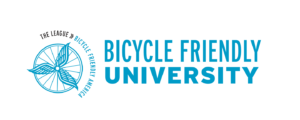As a part of our mission to Make Orange Green, our office is dedicated to promoting alternative transportation on campus–specifically, micro mobility.
Micro mobility refers to any human or electric-powered form of transportation capable of speeds up to, but not exceeding, 25 miles per hour. This includes walking, biking, skating, scooting, or any other form of PLEV usage. eBikes and eScooters are classified as PLEVs, or Personal Light Electric Vehicles. Other examples of PLEVs on campus are hoverboards, Segways, and any motorized, wheeled form of micro mobility (i.e., smaller than a car).
Micro mobility plays a key role in adapting cities to be more sustainable in the long run by addressing many of the issues caused by traditional cars. Whereas gas powered vehicles cause air pollution through the emission of greenhouse gases, human or electric-powered forms of transportation emit nothing. Taking alternative forms of transportation also solves many issues caused by traffic and parking.
You can contribute to Making Orange Green by using alternative forms of transportation whenever possible. Our office aims to make that easier for students, staff, faculty, and all visitors at the University of Tennessee, Knoxville. Amongst the many ways we work to facilitate alternative forms of transportation on campus, the Office of Sustainability recently partnered with Velotric to offer high-quality eBikes at an affordable price to students. We also work closely with Smart Trips, which rewards you for choosing sustainable methods of transportation.
Learn more about biking on campus here.
Parking, riding, rolling, or storage of bicycles or scooters inside buildings (including porches, entrances, and exit ways) is prohibited. Riding or rolling skateboards, hoverboards, or roller skates inside buildings is also prohibited.

Read about our Bicycle Friendly University designation here.